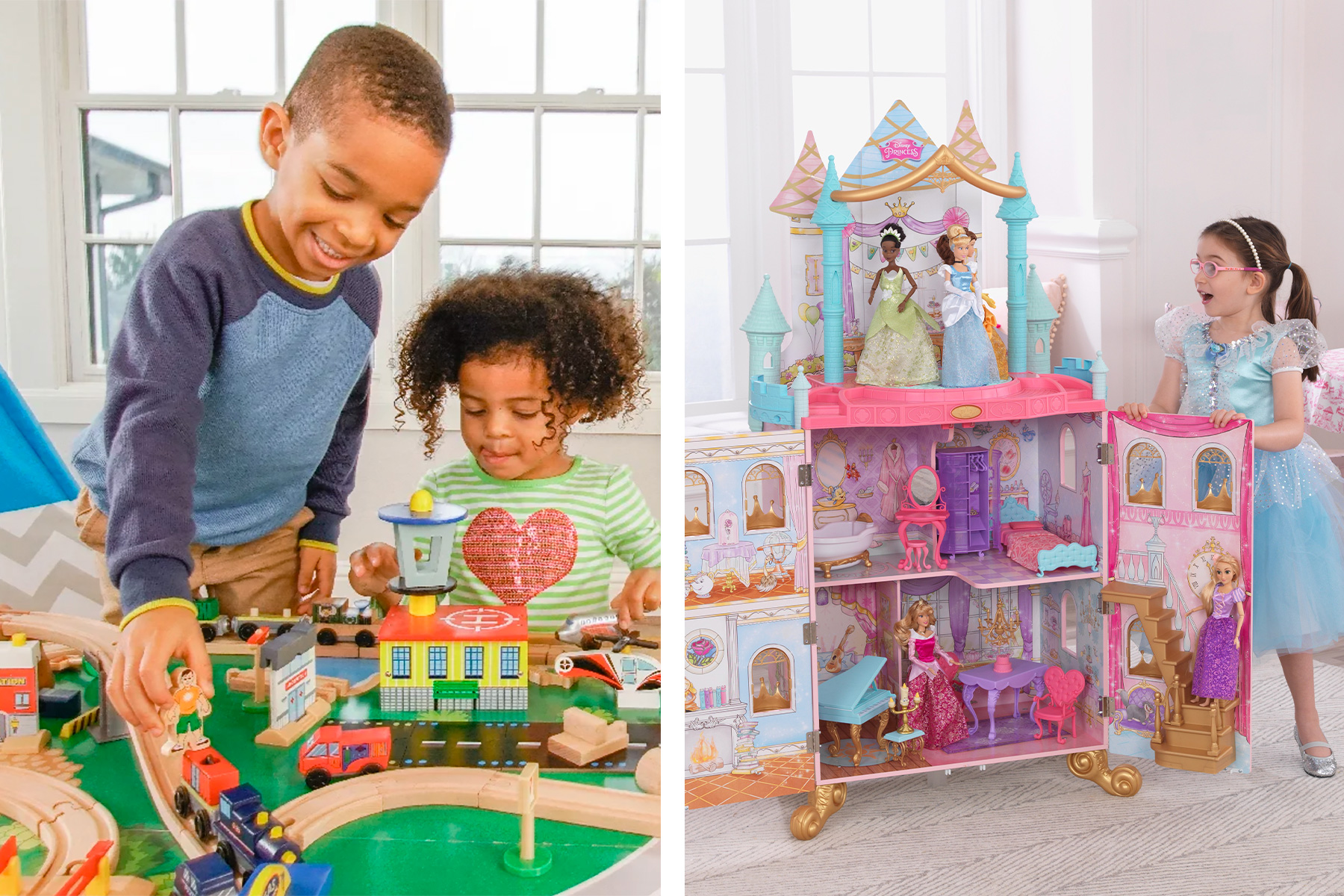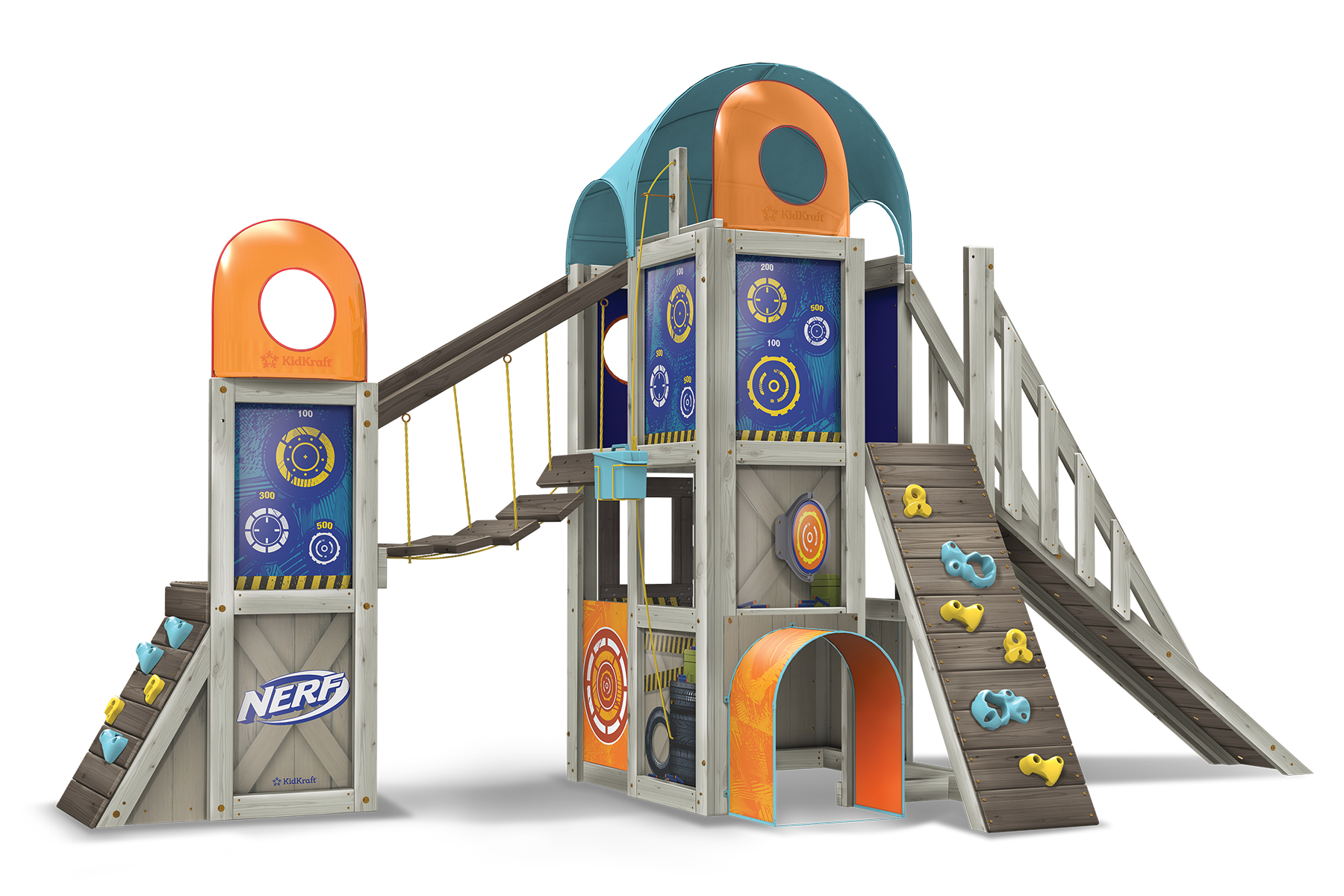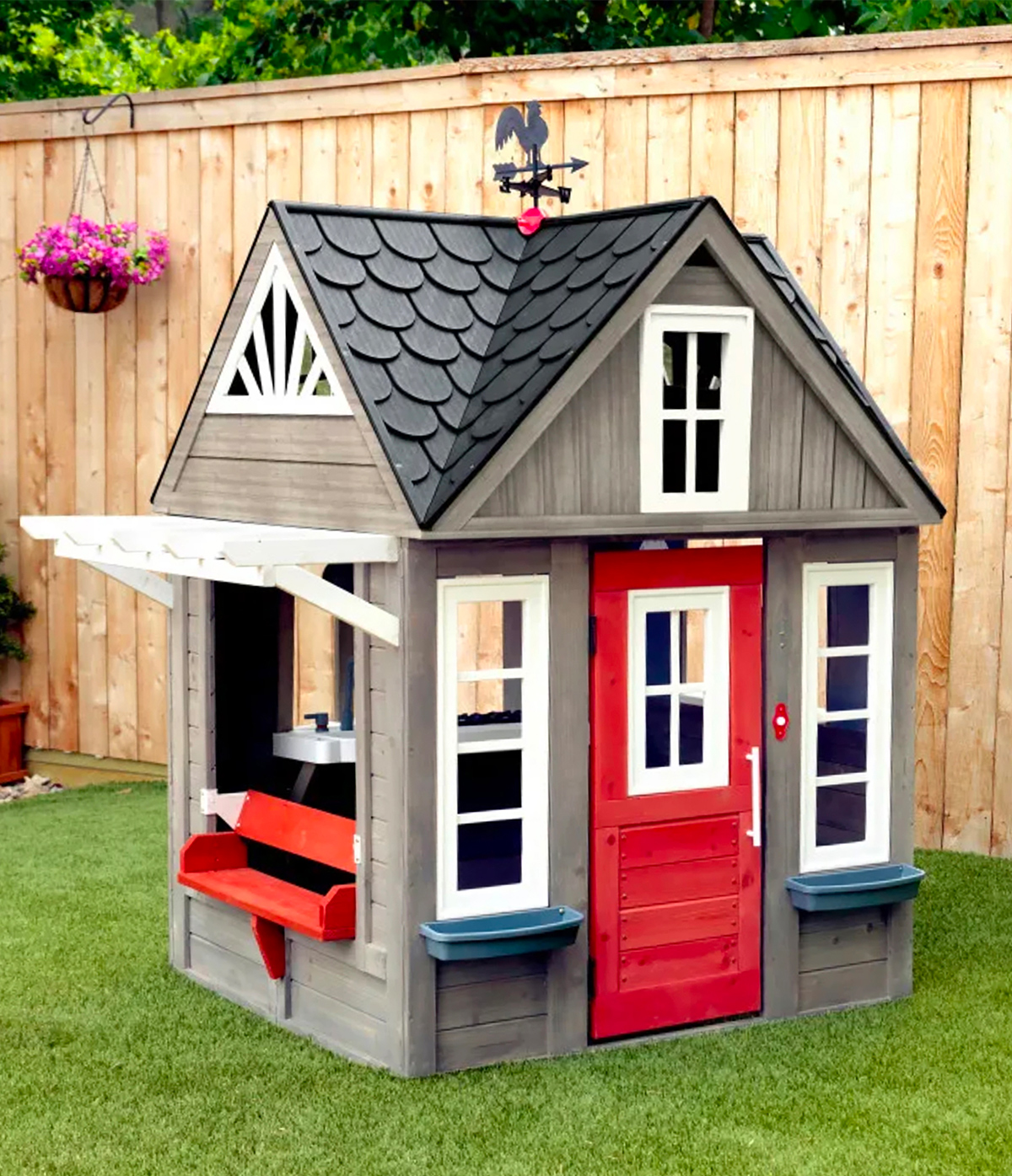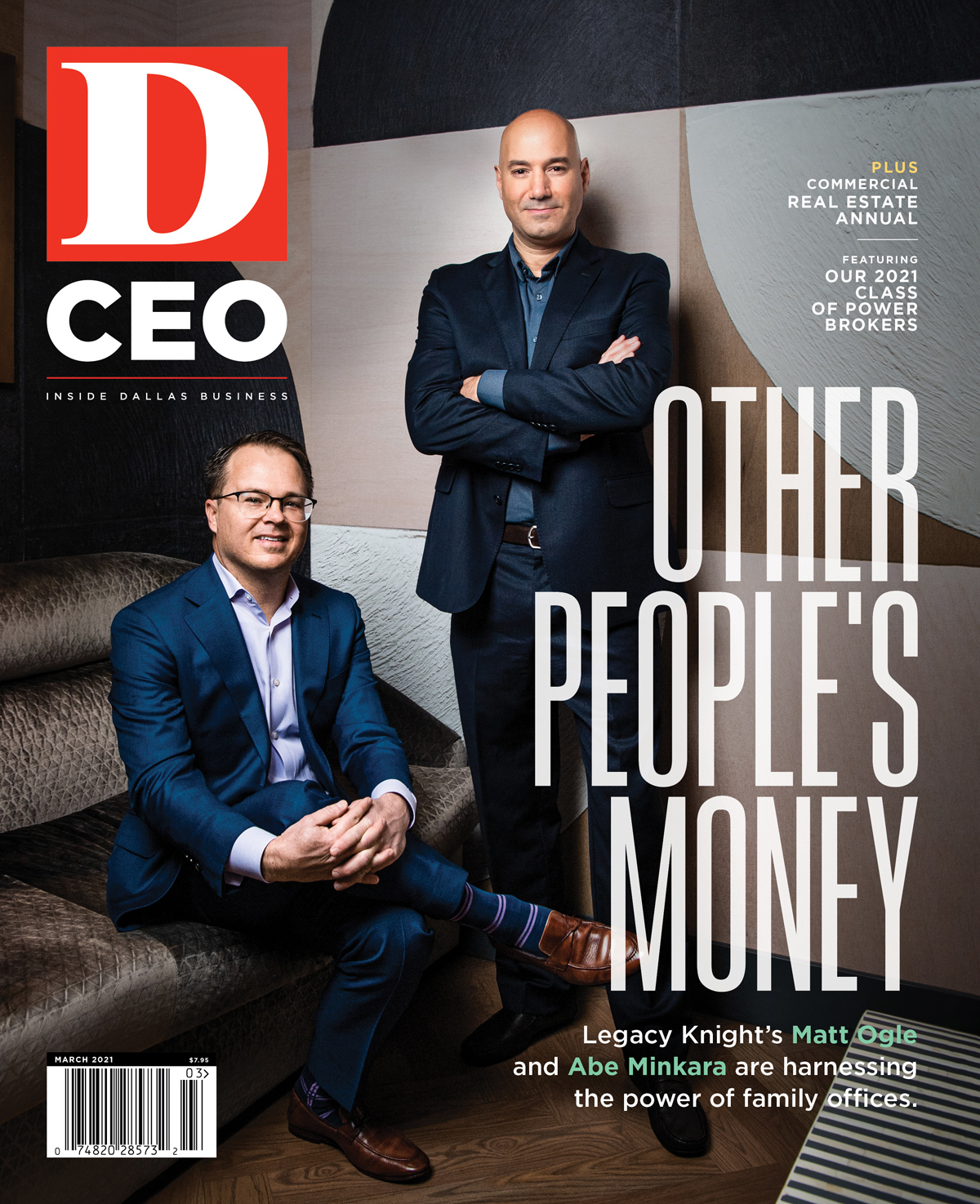Matt Rubel had a challenge on his hands. MidOcean Partners, the middle-market private equity firm he chairs, needed a new CEO to run one of its businesses, KidKraft.
MidOcean had acquired the Farmers Branch-based maker of children’s furniture, playsets, and toys in 2015. But three years later, growth at KidKraft had stalled. Rubel, a seasoned retail exec whose background includes leading Cole Haan and Tommy Hilfiger, had moved to Dallas a few years prior to run Varsity Brands. Because of his expertise and because he was already in North Texas, New York management at MidOcean asked Rubel if he would lead the effort to find new leadership for KidKraft.
For decades, the company had been run by Steven and Charmaine Lampert, owners of a custom furniture shop called Mica Designs, who acquired KidKraft in 1995. Steven ran operations; Charmaine was the innovator and creative force behind product development. In 2000, former Tandy and Bollinger exec David Barr joined the Lamperts at the reorganized KidKraft.
The company, which was first launched in the 1960s, had been generating sales through catalogs and other means. But bigger buyers, such as Costco predecessor Price Club, were interested in its made-from-wood, heirloom-quality children’s furniture. Barr, who had experience in product development, supply-chain, and overseas procurement and manufacturing, was brought in to help take things to the next level.
KidKraft’s production shifted to Asia in 2001. Within eight years, KidKraft opened offices in China and Amsterdam. It expanded beyond its furniture roots and applied its panel-assembly processes to dollhouses, play kitchens, and more. It also added outdoor furniture, playhouses, and swing sets, a segue that was boosted in 2016 when it acquired Solowave, a Canadian company behind the Big Backyard and Cedar Summit brands.
Despite being on, as Barr says, “a 20-percent growth kegger for 20 years,” MidOcean saw plenty of untapped potential at KidKraft. The operation is still relatively small, with about 300 total employees in Farmers Branch, Amsterdam, and China.

“MidOcean is an expert at enabling transitions from founder to larger-scale,” Rubel says. “The key was finding someone with the ability to do that who also had the creativity to do it in the imaginative play space. We searched all over the world for someone we believed could unlock the spirit of the way the company was set up by the founders and take it to the next stage of growth.”
The search ultimately led to Geoff Walker, a 23-year Mattel veteran who had a string of impressive successes in both product development and operations. Walker had turned around a number of Mattel businesses, including Hot Wheels and Fisher-Price; he ran its U.K. and Eastern European operations and expanded into Russia. He was well regarded in the industry and an active leader in The Toy Association, a trade group representing businesses that drive the $27 billion U.S. toy market. (Walker currently serves as the organization’s vice chair.) Everything fit.
When Rubel reached out, Walker was serving as Mattel’s head of innovation—another strength. “Geoff stood out for his outstanding leadership but also his love of the consumer and for unlocking creativity and fun and engagement,” Rubel says.
Barr, who remains at KidKraft as executive vice president of product development, global procurement, and supply chain, knew it would be hard to replace the Lamperts. But “it was immediately clear that Geoff brought the right mix,” he says. “I had been through a lot of interviews and temporary people in the position who did not. Geoff’s a toy guy. He’s been a toy guy his whole life.”
Walker was born in New Jersey, but his father’s job took him and his family to Palos Verdes, California, outside of Los Angeles, when he was 10 years old. He became buddies with a neighbor, Tom, whose father, Gene Kilroy, worked in advanced product development for Mattel. “He would bring home what I now know were early production pilots and let Tom and me play with them, like these little hand-held football video games,” Walker says. The experience left a lasting impression. “It made me want to work with a product I could touch and feel and enjoy,” Walker says. “Gene Kilroy was one of the big driving forces in my career.”
After getting an accounting degree at the University of Southern California, he worked at KPMG as an auditor for four years, then enrolled at Vanderbilt University in Nashville to pursue an MBA in marketing. Its Owen Business School was up and coming at the time; Walker liked the school’s energy. After graduating in 1994, he applied at Sega, Nintendo, Mattel, and Hasbro, but the job market was in a funk, and no one was hiring. Through a friend, he found work doing marketing for Dep, a hair products company in L.A. After about a year, he again pursued Mattel and was hired as a junior assistant brand manager, an entry-level marketing role for MBAs. His first assignment: shutting down a project.
Mattel had inked a deal with the Sylvester Stallone movie, Judge Dread. Two weeks before the movie opened, the company learned the flick had been given an R-rating—not at all in line with the toymaker’s action figures target of 3- to 8-year-old boys. Walker says the experience taught him a lot about working with entertainment properties and “being beholden to the screen.” He closed Judge Dread and segued into other burgeoning properties, including Mighty Ducks, a Disney animated series, and, eventually, Batman, after winning a license from Warner Bros. “That was a great victory to go out and do a big tentpole movie event that we could drive behind, a long-term property that had been in the marketplace for years,” Walker says.
His success quickly caught the attention of higher-ups, says Tim Kilpin, Walker’s former boss at Mattel, who now leads PlayMonster in Beloit, Wisconsin. “We saw Geoff as a future leader and started moving him around to get more and different experience,” Kilpin says. “We sensed how much he loved the business and how attuned he was to the industry. My boss and my peers and I would look at Geoff and say, ‘Oh yeah; he’s ready to be stretched. Let’s give him more of an opportunity. He has earned it.’”
Family Time
After Vanderbilt, Walker lived in a townhome in Manhattan Beach, California, with two young women. It was very Three’s Company. “Their names were Alex and Chrissy—I kid you not,” Walker says. He married one of his next-door neighbors, Shauna; the couple has a daughter and son, a senior and freshman at Greenhill School, respectively. The family has moved countless times for Walker’s career, including several stops on both coasts and a two-year stint in the U.K. “I’m very fortunate to have a partner like Shauna who has gone on the journey, and our kids, too,” Walker says. “We love Dallas. It’s an easy city to get around, compared to all of the traffic in L.A.. The people we’ve met in Dallas have been so welcoming, and our kids absolutely love it here. I see Dallas as a long-term place for us.”
Kilpin put Walker in charge of the Wheels division, which includes Hot Wheels and Matchbox. “It was an important piece of business, and it was struggling,” Kilpin says. “It was my sense that Geoff was the person to develop a new strategic direction. As a leader, you’re always looking at your team to see who is riding along with you. Sometimes you know they’re with you, and sometimes you’re not sure if they’re really invested. Through all the time Geoff worked directly for me, I knew he was riding with me. And when he disagreed with me, he told me—whatever it might be—and he always came up with another idea.”
Working with Hot Wheels, Walker focused on product branding, marketing, and innovation. It led to double-digit sales growth for a group that had been declining for years. Games (Uno, Pictionary, Scrabble) and Radica (youth electronics) were added to Walker’s responsibilities—putting him in charge of a $1.8 billion operation.
In 2011, wanting to give Walker experience in operations, company leaders asked him to run its European business. Its U.K. group had been in decline for several years, and Mattel also wanted to expand into Eastern Europe and Russia. “It gave me a good scope of the different lens you can look through in different marketplaces—how you deal with retailers and changing shifts in consumer patterns,” Walker says. He focused on e-commerce in the UK., making a big bet on Amazon, which at the time had just 3 percent of the market. He used traditional retail partners to open Russia and grow in Eastern Europe.

In 2013 he returned to the U.S., heading up Mattel’s Fisher-Price division in Buffalo, New York, where he became a diehard Bills fan. Walker’s turnaround of the $3 billion brand was framed around targeting millennial versus Gen-X parents. Two years later, he was back at Mattel’s corporate headquarters in L.A., leading its North American commercial division. The sales-focused role took him away from the creative side of things and required him to dig into the numbers and think more short-term versus long-term. After Margo Georgiadis joined Mattel as CEO, she wanted to reinvent the company around technology, and Walker was named chief strategic technology officer. In the role, he operated more like a tech startup CEO than an exec at a global enterprise. “One thing technology companies do very well is test and learn,” Walker says. “They cast a wide net then quickly scale the things that are working and walk away from things that aren’t.”
Walker was deep into new play patterns and new consumers for Mattel when Matt Rubel and KidKraft came calling.
There was a lot to love about the opportunity. KidKraft is a great brand with quality products that had made significant e-commerce inroads. It needed someone with commercial experience with strengths in branding and innovation—two big hot buttons for Walker. It also gave him a chance to bet on himself. “It meant going from a big company with a lot of bumpers around and a lot of resources to a smaller company where there’s no one else to blame,” he says. “Charmaine and Steve had built this amazing company, and when they left hands-on leadership, there were some bumps in the road. I was brought in to get it back on the road of innovation.”
Walker references Google’s 70-20-10 philosophy, where 70 percent of innovation time is spent on a business’ core (current models and revenue streams), 20 percent on adjacencies (products related to the core business), and 10 percent on blue sky. Walker calls it “magic or tragic.”
When you go blue sky, he says, “you can get some things that are amazing—or you can totally miss what the consumer is looking for.”
After building his team—including bringing in a new CFO, Todd Whitbeck—and making sure cash flow and working capital were set up in a way that allowed the company to move forward, Walker concentrated on product innovation, refocusing the company around imaginative play. As beautiful as they were, KidKraft products were a bit static. A partnership with Amazon led to a role-play, Alexa-enabled play kitchen, working with Echo and voice recognition to “gamify” the experience. Another new KidKraft product is Disney Princess Dance and Dreams, featuring a rooftop carousel where the dolls can twirl around to music. Both products were smash hits this past holiday season.
KidKraft’s outdoor products—playhouses and swing sets—are getting plenty of innovation attention, too. A $1,500 outdoor Nerf battle zone, a collaboration with Hasbro, will be released this summer. “They are amazing setups in forts we’ve created that will allow kids to take their blasters and have the greatest Nerf battles out there,” Walker says. “As kids are spending so much time on screen, people are looking to take their backyards and make them special. I want to create backyard envy; I want every family that has a backyard to think, ‘Wow. I have to get that.’”
Another revenue boost for KidKraft has come from its furniture line—especially children’s desks, with school closures due to COVID-19 leading parents to set up at-home learning spaces. The company ramped up desk production in early 2020, with new deliveries consistently selling out. Growth across all three product lines led to record-breaking sales in 2020. And it’s a trend Walker expects to continue, buoyed by ongoing shifts in consumer patterns. “The last 10 to 15 years have been about globalization,” he says. “What we’re seeing now is localization. People are becoming very local.”
Walker has a name for his growth strategy: “Ages and Stages.” It speaks to taking each of the company’s categories and bringing users in younger and keeping them longer as they get older. A new, expanded preschool line focuses not just on play, but on developmental benefits, nurturing climbing, walking, and other skills. From preschool, the children move into the core of KidKraft’s products—swing sets, playsets, and the like. Then, as they continue to grow, they move into things such as the Nerf battle zone, which targets children age 8 and older.
“The talent here is amazing,” Walker says of his design team. “The challenges are in consumer insights research at a small company, versus what I was used to at Mattel. You have to trust your gut a little more here. I was used to big budgets; managing cash here is different, too. You have to treat it like it’s your own money and manage everything to a tight budget while still giving it over for innovation and future projects.”

Two years into his CEO post, Walker says the biggest challenge has been maintaining culture while so many employees are working from home. He’s the kind of guy who likes to work the room and connect with people on his team. For now, he’s holding Zoom meetings with employees in North Texas and Amsterdam. Due to growth, KidKraft has been hiring. Walker introduces new staff during the Zoom meetings by asking them five rapid-fire questions, including “What’s your favorite toy?”He says if people don’t bond with one another, it makes retention more of a challenge.
Walker also has spent time on what he calls helping the company “build new muscle.” Adding play and other kid-targeted features had to be taught, as did risk-taking. For years, people in product development were executing ideas that came from Charmaine. They had to learn to share their own blue-sky concepts. Some have landed with a thud, but others that have taken off, such as an A-frame playhouse with a rock wall and a turtle-themed balance beam—both designed by a former barista who has no formal design training.
“The amount of new, interesting, creative play concepts that are coming from the company are just incredible,” Walker says. “We took the positive growth from this past year and invested for the future. This summer, with the outdoor business, and next Christmas will be bigger than ever for us. And we have amazing things coming in 2022, too.”
Rubel is happy with the results of his recruitment effort to land Walker, who has turned KidKraft into a growth company. But by celebrating make-believe, he says, the new CEO and his team are accomplishing so much more. “They’ve reignited a mission that’s so important to all of us—unlocking the imagination of the youth of America. This little gem in Dallas is quietly impacting things in a positive way.”
Get the D CEO Newsletter
Author







